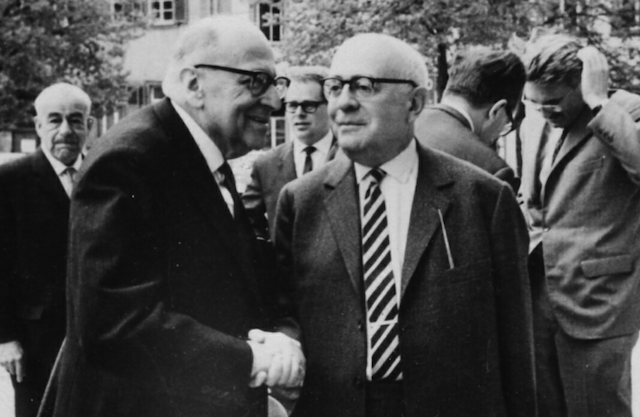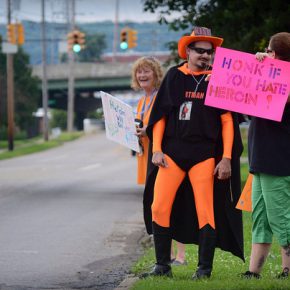As a practical matter, it seems to be very difficult to write a book about the Frankfurt School (or any of its related figures) which is not hagiographical, impenetrable, interminable, or some combination of the three. I can count on one hand the number of titles on this topic that did not prompt me to the immediate consumption of alcohol or some sort of stimulant.
Which is not to say that they aren’t worth reading. Anyone who has plowed their way through the nearly 800 pages of Rolf Wiggershaus’s exhaustively researched Die Frankfurter Schule: Geschichte. Theoretische Entwicklung. Politische Bedeutung will know that there is a lot to be learned there. You just have to be willing to kill off a little bit of your soul to get to it.
Stewart Jeffries’ new book, Grand Hotel Abyss: The Lives of the Frankfurt School, does about as good a job as it is possible to do of creating an exception to the strictures noted above. True, it does run to almost 500 pages, but it is written in an unaffected, almost conversational style that makes reasonably light going of even the most obscure philosophical matters, while only occasionally sounding chatty. Jeffries’ approach is generally biographical, taking cross-sections of the life histories of the associated major figures (Adorno, Horkheimer, Marcuse, Walter Benjamin, Friedrich Pollock, Henryk Grossman, and others) for the first six decades of the 20th century. If the common theme of this book is not the death of fathers (or more properly the killing of fathers), it certainly looms large in his narrative.
The story of the Frankfurt School is the signature tragedy of the intellectual left of the 20th century. The main points of the narrative will be known to most at this point: Felix Weil convinces his industrialist father to bankroll a radical research institute linked to the Goethe University in Frankfurt; a group of brilliantly unorthodox Jewish Marxists create a kind of theoretical Camelot as the storm clouds of National Socialism gather; they are forced into exile in Geneva, Paris, Oxford, New York, and California; the institute is reborn in the wake of destruction of National Socialism, but things are never quite the same; and finally a younger generation comes along intent on enacting their own rituals of patricide in order to effect the radical political and social changes that they seek.
Jeffries’ intent is clearly not to investigate the highest regions of theory. What he does is tell an interesting and theoretically informed story about intellectual history in the era of National Socialism and the Cold War. Much of the early part of the book is devoted to the ways that the major figures of the Frankfurt School transformed themselves from a bunch of silver spoons into critical Marxist thinkers. This is particularly true of Adorno and Benjamin, but it applies to one degree or another to pretty much all of them. The (figurative) parricidal aspect of this development forms the spine of the first third of the book and provides a narrative that is rich enough for experts, yet straightforward enough for the casual reader to follow.
The middle third or so is devoted to the fragmentation of the Institute and its members in the face of the National Socialist seizure of power and the rise of European fascism. Once again, readers familiar with the overall narrative will find much that is familiar, from Adorno’s troubled collaboration with Paul Lazarsfeld’s empirical research project at Columbia, to Herbert Marcuse and Franz Neumann’s work with the OSS, to Adorno and Horkheimer’s exile in Los Angeles in the community of other German exiles such as Thomas Mann, Hanns Eisler, and Arnold Schönberg.
The underlying story of this part of the history is the systematic scrubbing of references to Marx from the intellectual project of the Institute (although some like Marcuse never quite gave in to this). Jeffries makes many good points, although I was a bit surprised that he did not mention explicitly (or if he did I missed it) the fact that Horkheimer systematically scrubbed all references to Marx and Marxism out of 1947 Querido edition Dialektik der Aufklärung. [For those who are interested, the excised passages can be found in volume 5 of Horkheimer’s Gesammelte Schriften and in Edmund Jephcott’s retranslation from 2002.] This is a fairly minor quibble (if it is valid at all), as Jeffries makes the point effectively in other ways.
The history of the Institute in the 1950s showed that, although National Socialism had been defeated, much irreparable damage had already been done. Horkheimer (and later Adorno) returned to Germany to rebuild the Institute. Benjamin was dead, having committed suicide to avoid capture on the Spanish border while fleeing Vichy France. Others, such as Marcuse, Erich Fromm, and Leo Löwenthal, chose to remain in the United States. In Germany, Horkheimer and Adorno struggled to cope with a society shattered by war and (by and large) unwilling to come to terms with the unbearable heritage of Nazism.
Perhaps Jeffries’ finest hour is his recounting of the troubles faced by Adorno and Horkheimer in coming to terms with the new generation of radical students. Those who came of age in the 1960s were quick to familiarize themselves with Horkheimer and Adorno’s works from the 1940s, especially with Adorno’s Minima Moralia. But these were people who had grown up in the shadow of Nazism (speaking here of those in the cohort after the former Flakhelfer like Habermas who came of age in the 1950s). They were very much conscious of the failure of earlier generations of radical to prevent the rise of fascism and were determined to make use of both theoretical tools and direct action to ensure that it did not happen again.
For Adorno and Horkheimer, the students’ obsession with direct action smacked of a reenactment of precisely the sort of repressive violence that that they were trying to avoid in the first place. While in the United States, Marcuse became the darling of the radical crowd, and Adorno courted their wrath by insisting that his works not be made the basis for acts of exclusionary violence. What resulted was the bizarre situation in which shameless scholars of the extreme right (such as Helmut Schelsky and Arnold Gehlen) were allowed to teach freely, while Adorno was effectively hounded out of academia. Adorno’s famous complaint (“I came up with a theoretical model of analysis. How was I to know people would try to realize it with molotov cocktails?”) reads as one of the most tragic expressions in the history of the postwar left.
At the same time, it’s hard to escape the conclusion that at least some of Adorno’s critics had a point. The position of the Frankfurt School toward the status (and even the possibility) of de-fetishising critique was hard to take seriously on the activist left. In Adorno’s later publications, especially Negative Dialektik and his posthumously published Aesthetische Theorie (a book described by its English-language translator as almost too interesting to read), truth becomes progressively reduced until it manifests only in momentary flashes from works of art. This is hardly the sort of critical succor needed by those whose doors might potentially be kicked in by the representatives of a renascent fascism.
In the end, the story has a hopeful dimension. Marcuse’s later work is problematic, but at least provides rigorous readers with some ideas for how to reconfigure the left in a post-proletarian era. Habermas, too, presents more hopeful prospects, particularly in his work on the theory of communicative action and his later writings on politics and religion. If Habermas does end up plumping for a sort of progressive, consensus- oriented liberalism, he at least avoids the unproductive and unsatisfying tail-chasing of Adorno’s later work.
There is much that is positive in Jeffries’ work, but there are a couple of issues one might raise. At some points, his narrative slides into trivia, in particular, at the point where he devotes several unnecessary pages to the bampot theory that Walter Benjamin was murdered by Stalinist agents. There is an oddly unbalanced quality to the later parts of the book, and the section on Habermas seems at points like an afterthought. Also, the author either does not speak German or chose not to use any German language sources.
Under other circumstances this might be catastrophic, but the fact of the matter is that a very large proportion of the relevant source material is now available in translation. True, some of the translations are less than optimal (Ashton’s translation of Negative Dialektik is a notable example). But, having read most of these texts in the original, I can say that I didn’t really notice any place where Jeffries obviously got it wrong, and that’s the real issue here.
Certainly, Jeffries could have produced a deeper and more complex work if he had had access to more of the German language secondary literature (among other things). But this would have made the book longer, without necessarily making it better. There are plenty of in-depth theoretical treatments of the Frankfurt School, from Martin Jay’s Dialectical Imagination, to Wiggershaus’s Frankfurter Schule, to Wheatland’s Frankfurt School in Exile. Jeffries has taken on a different task: to relate the history of the Frankfurt School in a way that is relatable.
For those who are new to the topic, Grand Hotel Abyss provides a substantial and readable introduction with a wealth of avenues for further study. For those more deeply engaged, Jeffries’ book still offers a great deal in terms of a narrative that effectively renders and situates the major problems that the thinkers associated with the Institute confronted. It is a book that succeeds at many levels, and given the difficulty of the underlying subject matter, that is quite an impressive achievement.
Photograph courtesy of Wikipedia. Published under a Creative Commons license.





